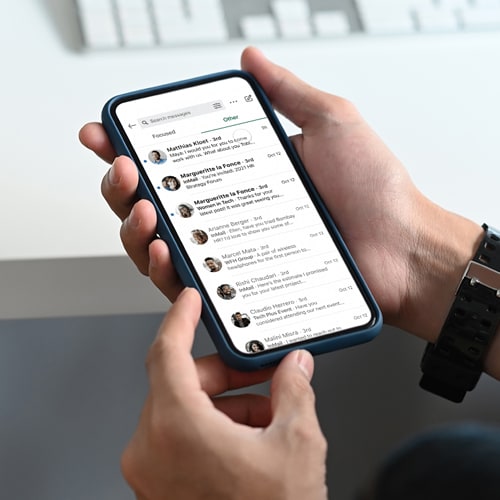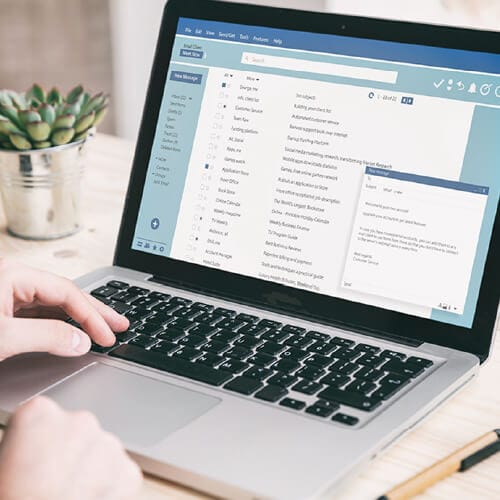Fiverr is an online marketplace where freelancers offer services to people and businesses worldwide. The platform features talent across more than 700 categories, supporting a range of skills to meet nearly any business need. But, with a Trustpilot score of only 3.5 out of 5 stars, you may wonder if Fiverr is safe.
Read on to discover Fiverr's safety features, risks, and tips for using the platform safely.
What makes Fiverr legit?
Fiverr is legit thanks to its built-in security features, such as secure payments, credit card protection, verified user profiles, and transparent reviews. The platform also offers dispute resolution support to help resolve issues freelancers or clients may encounter. These safety features help create a safer experience for all users and reduce the likelihood of scams.
Secure payment system
Fiverr processes payments directly through its platform. This helps protect your financial and personal information by keeping transactions secure within Fiverr’s system. As a Level 1 PCI-DSS certified provider, with the highest level of payment security compliance, Fiverr meets top industry standards for handling credit card data.
Payment methods accepted by Fiverr include the following:
- Fiverr Balance
- Credit card
- Debit card
- Apple Pay
- Google Pay
- iDeal
- PayPal
- PayPal Pay Later
- Venmo
- Wire Transfer
User reviews and ratings
Fiverr’s user reviews let buyers share their experiences after a project is completed. Freelancers receive ratings based on specific criteria, and buyers can leave detailed feedback that’s visible to everyone. This helps buyers avoid unreliable freelancers and encourages freelancers to maintain high-quality work, protecting buyers from poor service or scams.
Required identity verification
Fiverr requires freelancers to verify their identity before offering services. Freelancers do this by submitting personally identifiable information (PII), like a government ID, or completing phone verification. This helps ensure that freelancers are who they say they are, reducing the risk of fraud and scams.
Dispute resolution support
Fiverr's Resolution Center helps freelancers and clients address order-related issues like cancellations, delays, or misunderstandings. Users can try resolving problems directly through the platform, and if that fails, Fiverr’s customer support team can step in to mediate.
This system offers a structured way to handle disputes, helping to protect users from lost payments, unmet expectations, or miscommunication.
Scams and other risks of Fiverr
Both freelancers and clients can encounter issues on Fiverr, ranging from payment scams and phishing attempts to fake profiles and chargeback fraud. Understanding these risks can help you identify scammers early and take steps to protect your time, money, and personal information.
Off-platform payment scams
A common Fiverr scam involves clients or freelancers asking to move the conversation and the payment off the platform. This might happen through requests to connect via WhatsApp, email, or another messaging app.
These scams often lure users with offers that seem too good to be true. But once you're off Fiverr, you lose access to its built-in protections, including secure payment processing and dispute resolution.
For example, one Reddit user said a new Fiverr account contacted him for a video editing job and then asked to continue the chat on WhatsApp. The client offered nearly $4,000 and promised to pay via PayPal or bank transfer. The high pay, off-platform communication, and new account all pointed to a scam.
In these situations, both freelancers and clients are at risk. Freelancers may deliver work and never receive payment, while clients who send money upfront might receive plagiarized work or nothing at all. To stay protected, keep all communication and payments within Fiverr.
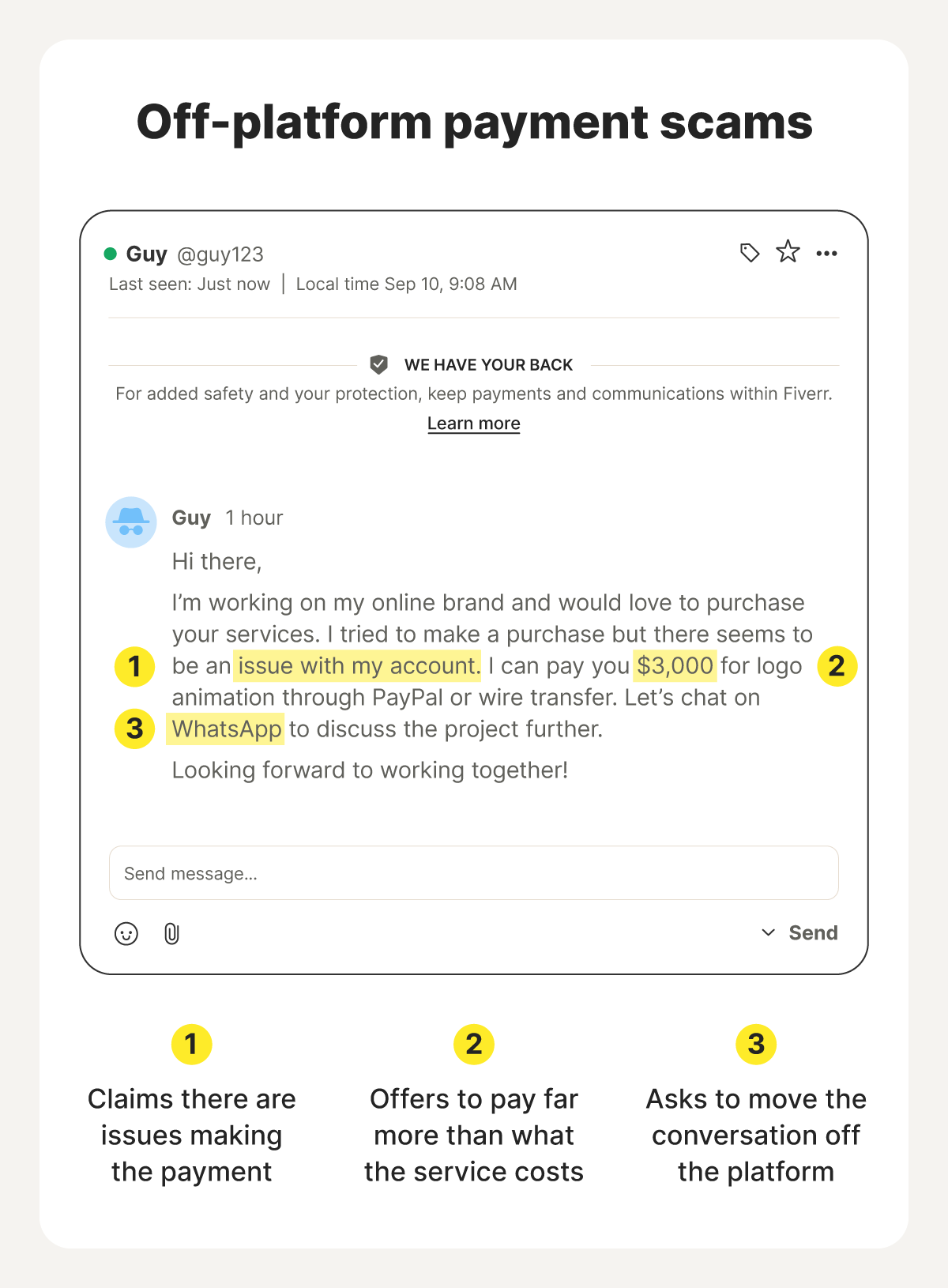

Phishing messages
On Fiverr, buyers can only message you if they’ve already placed an order or contacted you first, so random messages are rare. Still, scammers may pose as buyers you know or by sending fake job offers and urgent account warnings to steal your personal information. Be cautious with any unexpected messages asking you to click links or share details.
These messages target both freelancers and clients. A scammer might act like a buyer, send you a link, and hope you click it. Or they might pretend to be Fiverr support. This is also a common scam on CashApp and other payment platforms.
If you click a phishing link or share your login details, your account could get hacked or your personal information could be stolen. To stay safe, don’t click links from strangers and report suspicious messages to Fiverr.
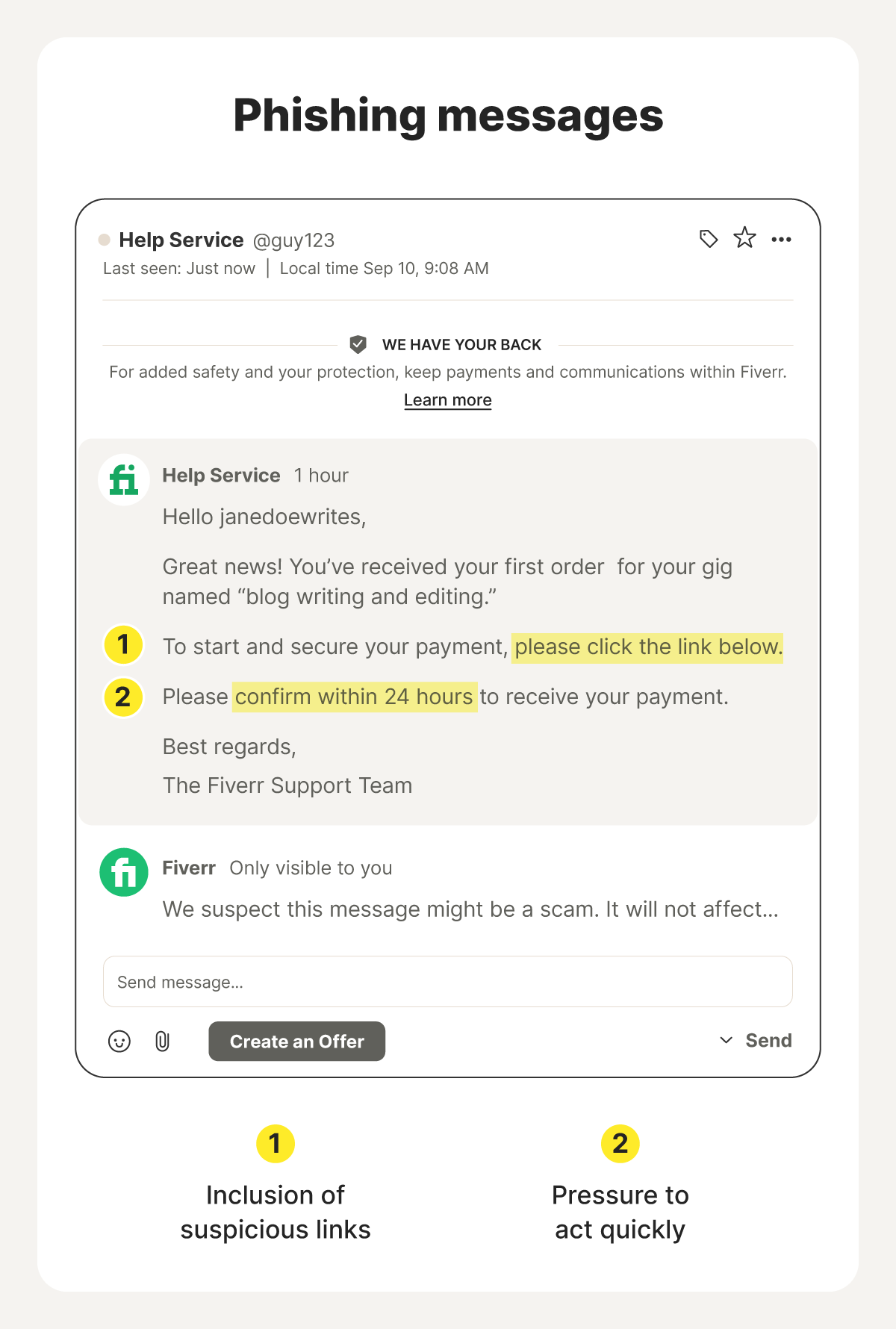

Plagiarized work
Plagiarized work is when a freelancer copies content from other websites or books and tries to pass it off as their own. This is a huge problem for buyers since using plagiarized work can get you in legal trouble, hurt your reputation, and delay your project.
One Fiverr buyer on Reddit hired a Fiverr freelancer to create a 40,000-word nonfiction book. The freelancer missed the deadline and sent only part of the book at first. The rest came later through inbox messages after the order was automatically marked as complete. Weeks later, the buyer discovered that 30% of the book was plagiarized.
There are scams on Fiverr that use AI too. Some freelancers generate content entirely using AI and present it as original work without proper disclosure. This practice can also be considered a scam, since it misrepresents the work’s originality.
To protect yourself, always check the work right away using a plagiarism checker, and avoid letting orders auto-complete without reviewing them first.
Fake profiles
Some scammers use AI-created profiles and pretend to have skills they don’t actually have. They might use fake names and AI-generated profile photos or lie about their experience. Some even copy real freelancers’ work samples to appear more professional than they are.
This can cause serious problems for buyers. You might pay someone who isn’t qualified, get low-quality or plagiarized work, or, in the worst cases, receive nothing.
To avoid fake profiles, watch for red flags like brand-new accounts with tons of 5-star reviews, prices that seem too good to be true, or vague service descriptions. Always check reviews, ask questions before placing an order, and choose sellers with verified profiles and clear portfolios.
Requests for personal information
Scammers may ask freelancers or buyers for personal details like your address, phone number, or email, often claiming it’s needed for “tax purposes” or to fix a payment problem. However, Fiverr handles all payments and communication within its platform, so you should never share this kind of information.
One Fiverr user shared a story on Reddit about a buyer who said they faced an error during payment and asked for the seller’s email address. The buyer even sent a fake screenshot showing a field asking for the seller’s email. The seller knew this was likely a scam since Fiverr doesn’t require sharing emails to complete payments.
Sharing your personal information can put you at risk of identity theft, social engineering, or additional scam attempts. To stay safe, never share details like your email, phone number, or address on Fiverr, and report any suspicious requests immediately.
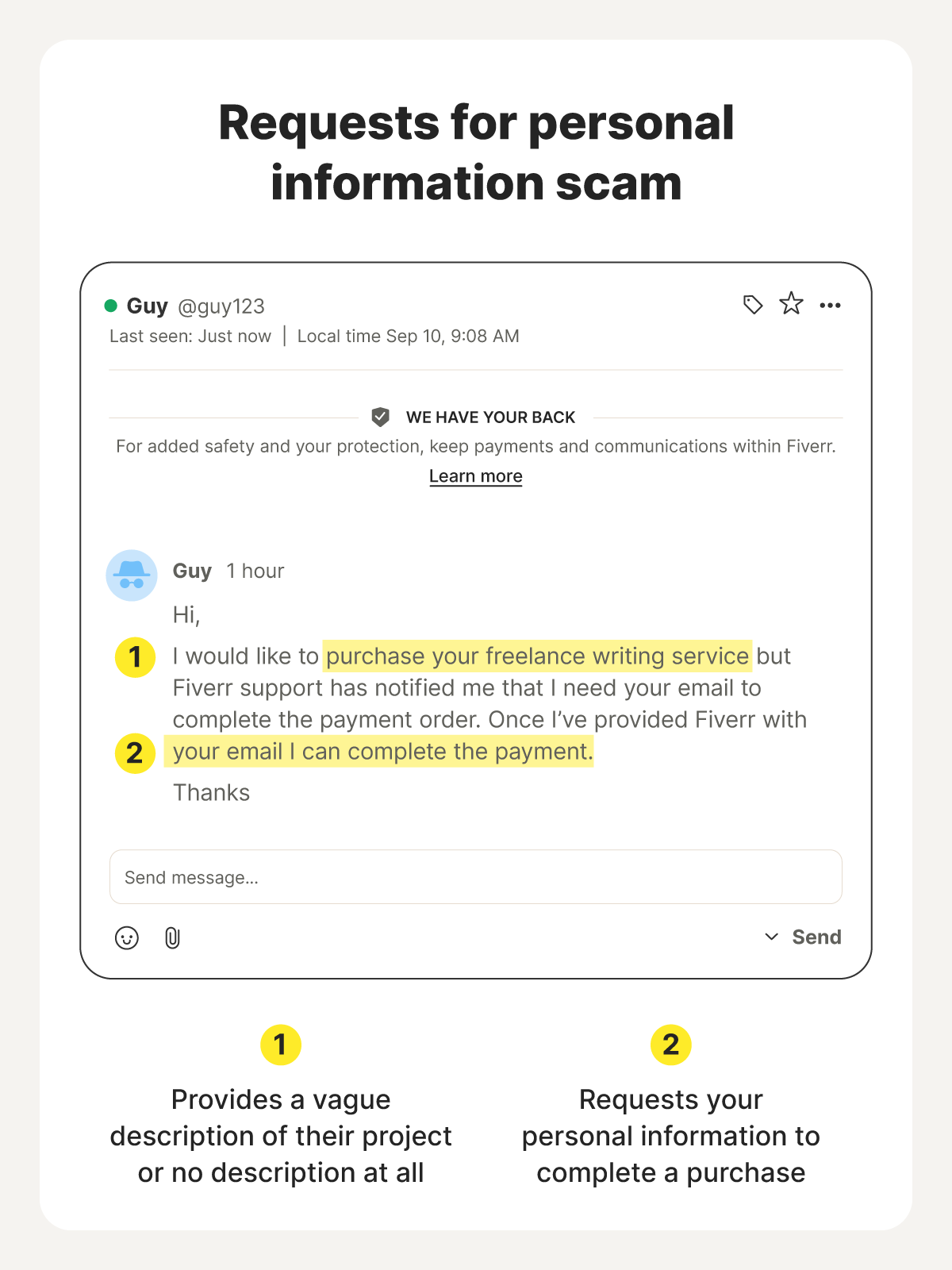

Chargeback fraud
Chargeback fraud happens when a buyer pays for a service but then asks their bank to cancel the payment after the work is done. The bank reverses the money, taking it back from the freelancer, even if the freelancer completed the job.
This can hurt freelancers because they lose both the payment, and the work they did. Fiverr tries to protect freelancers by reviewing chargeback cases, but sometimes the process can take time, and not all cases are decided in the freelancer’s favor.
To reduce the risk, freelancers should keep clear records of their work and communication with clients, so they can prove the job was completed if a chargeback happens.
Excessive revision requests
Some buyers abuse Fiverr’s revision system by constantly asking for changes, often beyond what was agreed on in the original offer. Even if a seller sets a limit on revisions, Fiverr’s system still makes it easy for buyers to request more, which can lead to unfair workloads.
One freelancer shared a story on Reddit about a repeat buyer who always requested changes, even when the work matched the original request. The seller offered custom gigs with zero revisions, but the buyer still found ways to ask for edits, sometimes five times per order.
The revisions weren’t due to mistakes but to the buyer changing their mind or not planning well. In one case, the buyer delayed approval just because they “didn’t have time to review” the work, putting the seller in a tough spot with no clear next step.
This behavior can waste a freelancer’s time, delay payments, and reduce their earnings. To protect yourself, be clear about your revision policy, keep written proof of all agreements, and contact Fiverr support if a buyer is unreasonable.
Warning signs of a sketchy freelancer
Some freelancers use fake information, produce rushed, low-quality work, or overpromise to win business. Knowing what red flags to watch out for can help buyers avoid scams.
Here are a few signs of a sketchy Fiverr freelancer:
- Generic or stolen portfolio: If a seller’s portfolio looks vague or includes work copied from elsewhere, they likely don’t have the skills they are advertising.
- Stock image profile picture: Photos that appear in reverse image searches or look AI-generated are telltale signs that the profile is fake.
- Too-good-to-be-true pricing: Extremely low prices for complex or high-quality work is typically a sign that a freelancer is cutting corners or is trying to lure buyers into a scam. Skilled professionals will charge a fair price for their experience.
- Very short delivery times: Promising high-quality work in just a few hours may lead to rushed results, missed deadlines, AI-generated work, or plagiarism.
- Poor communication: Freelancers who avoid direct answers, respond slowly, or give unclear replies may be unprofessional partners or worse, scammers trying to stall.
Warning signs of a sketchy buyer
From vague instructions to aggressive behavior, sketchy buyers can waste your time, delay payments, or pressure you into doing extra work for free. Spotting these red flags early helps protect your income, boundaries, and peace of mind.
Here are a few signs of a sketchy Fiverr buyer:
- Unrealistic expectations: If a buyer expects a complex project to be done quickly and for a very low price, it’s a sign they may not value your work. These buyers often become demanding, refuse to pay fairly, or leave bad reviews if their high expectations aren’t met.
- Vague brief: When a buyer provides little detail about what they want, it is difficult to deliver the right work. This can lead to confusion, repeated revisions, or disputes, especially if the buyer later claims the work didn’t meet their expectations.
- Refusal to clarify details: If a buyer refuses to clarify details, it can leave you unsure of the project's scope. Some do this intentionally to stay vague, then later claim the work is incorrect and push for free revisions or extra services you didn’t agree to.
- Threatening behavior: Buyers who hint at leaving a bad review, cancelling the order, or reporting you for minor issues may be trying to bully you into extra work or free revisions.
- Excessive revision requests: Repeated requests for changes, especially after agreeing to limited revisions, are a tactic to squeeze more work out of you without paying extra.
Tips for using Fiverr safely
By following the guidelines below, you can protect yourself from Fiverr scams, prevent identity theft, and have a smoother experience whether you’re a freelancer or a client.
- Don’t click suspicious links: Avoid clicking suspicious links in Fiverr messages, especially if they come from unknown accounts or ask for personal info. Clicking unsafe links can lead to phishing scams or malware.
- Stay on the Fiverr platform: Keep all communication and payments inside Fiverr. The platform’s protections only apply when you use its messaging and payment systems. Requests to move off-platform are typically scams.
- Opt for top-rated freelancers: Choosing freelancers with high ratings and verified profiles reduces risk. Top-rated sellers have proven track records and usually deliver quality work on time.
- Don’t share sensitive information: Fiverr doesn’t require you to share sensitive data like your address, phone number, or email to complete transactions. If someone asks for more than what’s necessary, it's likely a scam.
- Vet profiles: Look closely at portfolios, reviews, and profile details before hiring. Watch for red flags like vague descriptions, inconsistent reviews, or stock photos that could mean the profile isn’t trustworthy.
- Check the fine print: Always review what the buyer or seller actually needs for your transaction to go smoothly. If the other party requests anything beyond that, it’s likely a scam or an attempt to cheat you.
- Use identity theft protection software: Using identity theft protection software like LifeLock can help protect your personal information in case you fall for a Fiverr scam.
What to do if you’ve been scammed on Fiverr
Whether you're a freelancer or a client, take the following steps to protect your personal information if you fall for a Fiverr scam.
- Try to resolve the issue through the Resolution Center: Fiverr’s Resolution Center lets buyers and sellers work out problems directly. You can request revisions, cancel orders, or extend delivery time.
- Report the user to Fiverr: If the other party is being dishonest, abusive, or violating Fiverr’s rules, you can report them. Go to the relevant page and click the three-dot menu to submit a report. Fiverr’s team will review the case.
- Contact Fiverr support: If the Resolution Center doesn’t solve the problem or if the issue involves a scam or phishing attempt, reach out to Fiverr’s Customer Support. Include clear details and evidence, such as screenshots, chat logs, and any files related to the order.
- Stop communication and block the user: If you suspect someone is scamming you, stop all communication and block them to prevent further messages. Don’t click on any links they’ve sent.
- Update your Fiverr login and passwords: If you’ve shared any personal info or clicked a suspicious link, change your Fiverr password immediately and enable two-factor authentication to secure your account.
- Consider identity theft protection: If you shared sensitive information like your email, phone number, or address, invest in identity theft protection software to monitor for signs of fraud.
Protect yourself from Fiverr scams with LifeLock
Using Fiverr is a legit way to find freelance work or hire talent, but it’s important to watch out for Fiverr scams. Tools like LifeLock Standard add an extra layer of protection by monitoring for identity theft and helping secure your personal information if something goes wrong.
Before starting any project, take a few minutes to vet the other party’s profile and set clear expectations. Those extra steps can help you avoid scams on Fiverr and other major headaches later.
FAQs
Why do some freelancers succeed on Fiverr while others struggle?
Successful freelancers build trust through strong profiles, positive reviews, and timely deliveries. Those who struggle may be taking on more work than they can deliver or underpricing their work.
Can you actually make money on Fiverr?
Yes, you can make money on Fiverr, but it takes time and effort. Success depends on your skills, pricing, reviews, and consistency. High earners often start with low rates, then scale.
Is Fiverr or Upwork better?
Fiverr is better for quick, one-off jobs with fixed prices. Upwork is better for long-term projects, hourly work, and building client relationships. Choose Fiverr if you want speed and simplicity. Choose Upwork if you want steady work and more control over project scope and rates.
Can you get a refund on Fiverr?
Yes, you can get a refund on Fiverr by canceling the order through the Resolution Center. If approved, funds return to your Fiverr Balance. You can then request a refund to your original payment method, which usually takes seven to 10 business days to process.
What happens if a Fiverr seller doesn’t deliver?
If a Fiverr seller doesn’t deliver on time, you can request an order cancellation or open a dispute in the Resolution Center. If the seller still doesn’t respond, Fiverr’s support can help you get a refund or find a solution.
Can you get hacked on Fiverr?
Yes, you can get hacked on Fiverr if you click on phishing links or share personal info with scammers. But as long as you practice good digital habits, Fivverr is safe. Always verify messages, avoid suspicious links, and enable two-factor authentication to protect your account.
Editor’s note: Our articles provide educational information. LifeLock offerings may not cover or protect against every type of crime, fraud, or threat we write about.
Start your protection,
enroll in minutes.
LifeLock is part of Gen – a global company with a family of trusted brands.
Copyright © 2026 Gen Digital Inc. All rights reserved. Gen trademarks or registered trademarks are property of Gen Digital Inc. or its affiliates. Firefox is a trademark of Mozilla Foundation. Android, Google Chrome, Google Play and the Google Play logo are trademarks of Google, LLC. Mac, iPhone, iPad, Apple and the Apple logo are trademarks of Apple Inc., registered in the U.S. and other countries. App Store is a service mark of Apple Inc. Alexa and all related logos are trademarks of Amazon.com, Inc. or its affiliates. Microsoft and the Window logo are trademarks of Microsoft Corporation in the U.S. and other countries. The Android robot is reproduced or modified from work created and shared by Google and used according to terms described in the Creative Commons 3.0 Attribution License. Other names may be trademarks of their respective owners.


